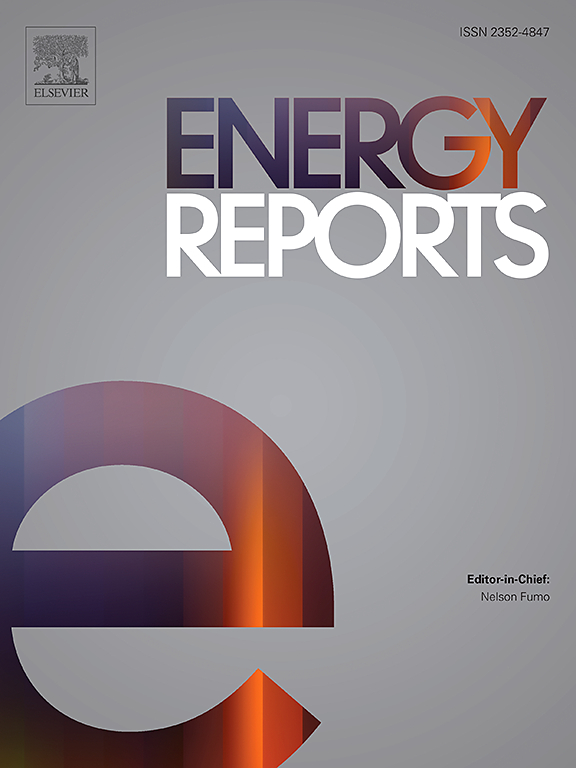增强电动交通能力:电动汽车充电的日前动态使用时间电价
IF 4.7
3区 工程技术
Q2 ENERGY & FUELS
引用次数: 0
摘要
温室气体和环境保护一直是许多国家和国际组织最优先关注的问题,这促使它们制定了降低对化石燃料依赖性和最大限度减少碳排放的目标和倡议。在许多倡议中,电动汽车(EV)比传统的碳燃料汽车更受重视。为支持电动汽车的大规模应用,需要一种动态电价方案来解决用户舒适度、节约和公用事业收入等复杂问题。在这项研究工作中,为住宅馈线上的集中式电动汽车充电站(EVCS)模拟了一种动态定价方案。该定价方案将现有的静态使用时间(ToU)定价与每小时动态 ToU 电价相结合,后者根据住宅馈线的需求水平而变化。建议的电价方案提供了一个具有可能价格变化范围的日前动态结构,以帮助电动汽车车主和日前充电机制提前安排电动汽车。所制定的方案按日、月、年计算收益并调整电价,包括需求费和回收部分,以应对投资收益不理想的情况。此外,在设计定价结构时还采用了粒子群优化(PSO)技术,通过设定尽可能低的电价和满足最低收入目标,确保了用户的便利性。仿真结果表明,所提出的动态定价方案能够有效地平衡各方利益。此外,测试案例的模拟结果表明,如果电动汽车车主计划正确,他们可以节省超过 32% 的充电费用。另一方面,在住宅馈电高峰时段,公用事业公司可获得超过现有费率 2.4 倍的收益。本文章由计算机程序翻译,如有差异,请以英文原文为准。
Empowering E-mobility: Day-ahead dynamic time of use tariff for electric vehicle charging
The greenhouse gases and preservation of the environment have been the most prioritized concern in many countries and international organizations, leading to set aims and initiatives for lowering the dependency on fossil fuels and minimizing carbon emissions. As a part of many initiatives, great emphasis is given to promoting electric vehicles (EVs) over their traditional carbon fuel-based counterpart. To support large-scale EV adoption, a dynamic tariff scheme is required that addresses complex issues like user comfort, savings, and utility revenue. In this research work, a dynamic pricing scheme is modeled for the centralized EV charging stations (EVCS) on a residential feeder. This pricing scheme integrates the existing static time of use (ToU) pricing to an hourly dynamic ToU tariff that varies according to the demand level in the residential feeder. The proposed tariff plan provides a day-ahead dynamic structure with a probable price variation range to aid the EV owners and the day-ahead charging mechanism to schedule the EVs beforehand. The developed scheme calculates the returns and adjusts the tariff including the demand charge and the recovery component on a daily, monthly, and yearly basis for the unsatisfactory investment revenue. Also, user convenience is ensured by setting the minimum possible tariff as well as satisfying the minimum revenue target with the integration of particle swarm optimization (PSO) in designing the pricing structure. The simulation results demonstrate the effectiveness of the proposed dynamic pricing scheme maintaining a trade-off between the interests of all parties involved. Moreover, the simulation outcome of the test case indicates that EV owners can save more than 32 % on charging bills if they plan correctly. On the other hand, the utility can earn more than 2.4 times the existing rate during the peak time of the residential feeder.
求助全文
通过发布文献求助,成功后即可免费获取论文全文。
去求助
来源期刊

Energy Reports
Energy-General Energy
CiteScore
8.20
自引率
13.50%
发文量
2608
审稿时长
38 days
期刊介绍:
Energy Reports is a new online multidisciplinary open access journal which focuses on publishing new research in the area of Energy with a rapid review and publication time. Energy Reports will be open to direct submissions and also to submissions from other Elsevier Energy journals, whose Editors have determined that Energy Reports would be a better fit.
 求助内容:
求助内容: 应助结果提醒方式:
应助结果提醒方式:


